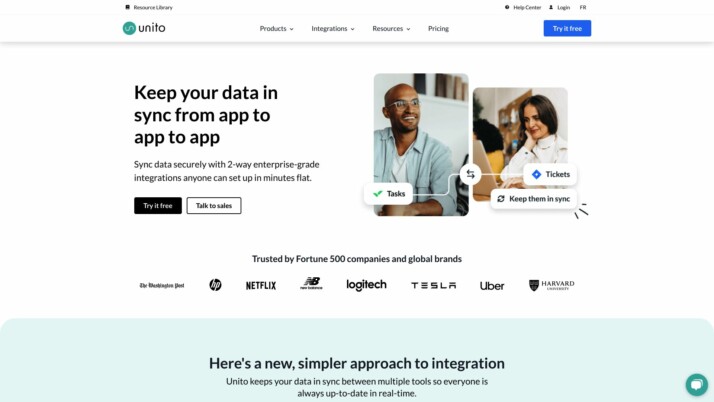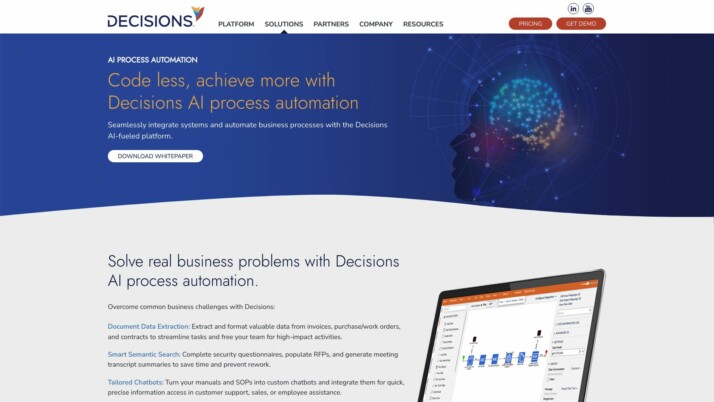Unito vs. Decisions: AI Workflow Automation Compared
AI-powered workflow automation revolutionizes how businesses operate, but choosing the right platform can be challenging. This comparison of Unito vs. Decisions, and SmythOS unveils key differences in integration capabilities, AI features, and overall flexibility. We explore how each platform tackles workflow automation, examining their strengths in data synchronization, process optimization, and AI deployment. By dissecting their unique approaches, we provide clarity on which solution best aligns with various business needs, from seamless tool integration to advanced AI-driven process automation. This analysis equips decision-makers with crucial insights to select a platform that not only streamlines current operations but also paves the way for future innovation and efficiency.
Unito Overview
Unito provides a powerful integration platform designed to synchronize data and workflows across multiple tools and teams. The company’s Sync Platform enables seamless connections between popular project management, collaboration, and development tools, eliminating data silos and enhancing cross-team productivity.
Unito’s core offering revolves around its real-time two-way sync technology. This feature ensures that information remains consistent across all connected applications, allowing teams to work in their preferred tools while maintaining data integrity. The platform supports deep field configuration, enabling users to customize syncing rules to match specific organizational needs.


Unito’s core offering revolves around its real-time two-way sync technology. This feature ensures that information remains consistent across all connected applications…
A standout feature of Unito is its no-code visual workflow designer. This intuitive interface empowers users to create complex integrations without programming knowledge, democratizing access to advanced workflow automation. The platform also offers historical syncing, bringing past data into new integrations for comprehensive project insights.
Unito prioritizes security and scalability, boasting SOC II Type 2 certification and enterprise-grade features. The platform can handle large-scale operations, syncing thousands of tasks across tools. However, Unito lacks AI agent capabilities and autonomous problem-solving features, focusing instead on robust data synchronization and workflow automation.
While Unito excels in connecting existing tools and streamlining workflows, it may not be the ideal choice for organizations seeking advanced AI-driven solutions or autonomous agent deployments. The platform’s strength lies in its ability to bridge gaps between different software ecosystems, making it particularly valuable for businesses struggling with tool fragmentation and data consistency issues across teams.
Decisions Overview
Decisions revolutionizes business process automation with its intelligent platform. The software empowers organizations to streamline operations through AI-driven workflows, rules engines, and data extraction capabilities. Decisions caters to businesses seeking efficiency gains without extensive coding requirements.


The platform’s standout feature is its no-code environment. Users leverage visual designers to craft applications, flows, rules, and dashboards, democratizing the development process. This approach allows both technical and non-technical team members to contribute to process optimization efforts.
Users leverage visual designers to craft applications, flows, rules, and dashboards, democratizing the development process.
Decisions excels in integration, seamlessly connecting with existing infrastructure through REST APIs. It supports popular systems like Salesforce and DocuSign, enabling businesses to enhance their current tech stack rather than replace it. The web-based delivery model ensures accessibility across various environments without the need for plugins or custom installations.
While Decisions offers robust automation capabilities, it’s important to note that it doesn’t provide hosted AI agents or autonomous agent functionalities. Instead, it focuses on intelligent process automation, document data extraction, and tailored chatbots. These features address specific business needs such as streamlining workflows, populating RFPs, and enhancing customer support.
The platform’s commitment to continuous improvement is evident in its latest release. Version 8 introduces process mining tools, allowing users to discover inefficiencies, identify bottlenecks, and oversee optimization efforts. This addition strengthens Decisions’ position as a comprehensive solution for businesses looking to embrace the future of operations through innovative automation.
Feature Comparison
Unito and Decisions offer different approaches to workflow automation, each with distinct feature sets. Unito excels in real-time two-way syncing between various tools, while Decisions focuses on intelligent process automation through a no-code environment.
Unito’s strength lies in its deep integration capabilities, allowing seamless data synchronization across multiple platforms. This includes custom field syncing and attachment streaming, enabling teams to view files without switching tools. However, Unito lacks AI agent capabilities and autonomous problem-solving features, limiting its ability to handle complex, adaptive tasks.
Decisions, on the other hand, provides a comprehensive platform for creating intelligent workflows and applications without extensive coding. It offers AI-driven document data extraction and smart semantic search, filling gaps in Unito’s feature set. Decisions also includes process mining tools for identifying inefficiencies, a capability absent in Unito.
Both platforms offer visual builders and no-code options, but their focus differs. Unito’s visual workflow designer centers on creating integrations between tools, while Decisions’ Studio provides a broader range of visual designers for flows, rules, forms, and dashboards. This makes Decisions more versatile for creating complex business applications beyond simple integrations.
In terms of security, both platforms prioritize data protection. However, Decisions appears to offer more advanced features like AI-driven security questionnaire completion, which is not mentioned in Unito’s capabilities. Unito’s focus on enterprise-level security and OAuth support indicates a strong commitment to data protection, but it may lack some of the AI-enhanced security features found in Decisions.
While both platforms support integration with external systems, Decisions seems to offer a more comprehensive approach with its ability to connect to a wider range of business applications and data sources. This could provide greater flexibility for businesses looking to automate diverse processes across their entire infrastructure.
Feature Comparison Table
| Unito | Decisions | SmythOS | |
|---|---|---|---|
| CORE FEATURES | |||
| Autonomous Agents | ❌ | ❌ | ✅ |
| Multimodal | ❌ | ❌ | ✅ |
| Multi-Agent Collaboration | ✅ | ❌ | ✅ |
| Human-AI Interaction | ❌ | ✅ | ✅ |
| Agent Work Scheduler | ❌ | ✅ | ✅ |
| SECURITY | |||
| Constrained Alignment | ✅ | ❌ | ✅ |
| IP Control | ❌ | ✅ | ✅ |
| COMPONENTS | |||
| Foundation AIs | ❌ | ❌ | ✅ |
| Huggingface AIs | ❌ | ❌ | ✅ |
| Zapier APIs | ✅ | ❌ | ✅ |
| Classifiers | ❌ | ✅ | ✅ |
| Logic | ✅ | ✅ | |
| Data Lakes | ❌ | ❌ | ✅ |
| DEPLOYMENT OPTIONS (EMBODIMENTS) | |||
| Deploy as Webhook | ❌ | ✅ | ✅ |
| Staging Domains | ❌ | ✅ | ✅ |
| Deploy as Site Chat | ❌ | ✅ | ✅ |
| Deploy as Scheduled Agent | ❌ | ✅ | ✅ |
| Deploy as GPT | ❌ | ❌ | ✅ |
| DATA LAKE SUPPORT | |||
| Hosted Vector Database | ❌ | ❌ | ✅ |
| Sitemap Crawler | ❌ | ❌ | ✅ |
| YouTube Transcript Crawler | ❌ | ❌ | ✅ |
| URL Crawler | ❌ | ❌ | ✅ |
| PDF Support | ❌ | ✅ | ✅ |
| Word File Support | ❌ | ✅ | ✅ |
| TXT File Support | ❌ | ✅ | ✅ |
Best Alternative to Unito and Decisions
SmythOS stands out as the superior alternative to Unito and Decisions, offering a comprehensive AI agent development platform that surpasses both in versatility and power. Our platform combines ease of use with an extensive feature set, enabling unlimited use cases for AI automation.
Unlike Unito’s focus on tool integration or Decisions’ process automation approach, SmythOS provides a complete ecosystem for creating, deploying, and managing autonomous AI agents. We offer a visual drag-and-drop interface that simplifies complex AI workflows, making advanced capabilities accessible to users of all skill levels.
SmythOS provides a complete ecosystem for creating, deploying, and managing autonomous AI agents… making advanced capabilities accessible to users of all skill levels.
SmythOS excels in areas where Unito and Decisions fall short. While Unito lacks AI agent capabilities and Decisions offers limited AI features, our platform supports a wide range of AI models and integrations. We enable multi-agent collaboration, allowing teams of AI agents to work together on complex tasks—a feature absent in both competitors.
Our platform’s deployment options far exceed those of Unito and Decisions. SmythOS allows you to deploy AI agents as APIs, webhooks, scheduled tasks, or even as GPT models. This flexibility ensures that your AI solutions can be seamlessly integrated into any existing workflow or system.
With SmythOS, you’re not just getting a tool—you’re unlocking a new realm of possibilities in AI automation. Our platform’s combination of powerful features, user-friendly design, and unmatched flexibility makes it the clear choice for businesses and developers looking to harness the full potential of AI technology.
Conclusion
Unito and Decisions each offer unique strengths in workflow automation, but SmythOS emerges as the superior choice for businesses seeking comprehensive AI-driven solutions. Unito excels in real-time data synchronization across tools, while Decisions provides robust process automation through its no-code environment. However, SmythOS combines the best of both worlds and pushes the boundaries of AI integration and deployment.
SmythOS stands out with its drag-and-drop interface for creating complex AI workflows, extensive integration ecosystem, and support for multi-agent orchestration. Unlike Unito and Decisions, SmythOS offers true AI agent capabilities, allowing for autonomous problem-solving and adaptable task handling. The platform’s ’Create Once, Deploy Anywhere’ approach provides unparalleled flexibility, enabling businesses to integrate AI solutions seamlessly into their existing infrastructure.
While Unito and Decisions may suit specific use cases, SmythOS offers a more comprehensive and future-proof solution. Its support for various AI models, extensive API integrations, and versatile deployment options position it as the ideal choice for businesses looking to fully leverage AI capabilities. SmythOS not only streamlines current processes but also opens up new possibilities for innovation and efficiency gains across industries.
To experience the power of SmythOS and revolutionize your approach to AI integration, create a free SmythOS account today. With unlimited agents and a risk-free trial, you can explore how SmythOS can transform your workflow and unlock the full potential of AI for your business. Discover our diverse range of AI-powered agent templates to jumpstart your journey into the future of workforce automation.
Last updated:
Disclaimer: The information presented in this article is for general informational purposes only and is provided as is. While we strive to keep the content up-to-date and accurate, we make no representations or warranties of any kind, express or implied, about the completeness, accuracy, reliability, suitability, or availability of the information contained in this article.
Any reliance you place on such information is strictly at your own risk. We reserve the right to make additions, deletions, or modifications to the contents of this article at any time without prior notice.
In no event will we be liable for any loss or damage including without limitation, indirect or consequential loss or damage, or any loss or damage whatsoever arising from loss of data, profits, or any other loss not specified herein arising out of, or in connection with, the use of this article.
Despite our best efforts, this article may contain oversights, errors, or omissions. If you notice any inaccuracies or have concerns about the content, please report them through our content feedback form. Your input helps us maintain the quality and reliability of our information.
